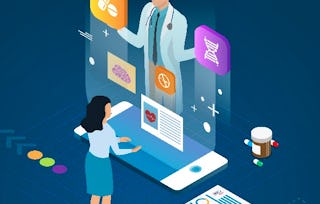This module addresses the ethical, legal, and privacy challenges associated with digital health technologies. Learners will evaluate regulatory compliance, patient data protection, and ethical decision-making in the adoption of digital tools in healthcare.

Ethical Consideration in Digital Health
Ends soon: Gain next-level skills with Coursera Plus for $199 (regularly $399). Save now.

Ethical Consideration in Digital Health
This course is part of multiple programs.

Instructor: Prof. Paul S. Lalvani
Included with
Recommended experience
What you'll learn
Understand core ethical principles in digital health, including autonomy, privacy, equity, transparency, and patient safety.
Explore bioethics frameworks, global regulations, and strategies for responsible, inclusive digital health innovation.
Analyse ethical challenges of AI in healthcare, focusing on privacy, bias, security, and practical guidelines for adoption.
Skills you'll gain
- Data Ethics
- Ethical Standards And Conduct
- Health Information Management
- Healthcare Ethics
- Law, Regulation, and Compliance
- Telehealth
- AI Security
- Health Technology
- Informed Consent
- Health Equity
- Healthcare Industry Knowledge
- Health Care Procedure and Regulation
- Information Privacy
- Clinical Research Ethics
- Data Governance
- Data Security
- Medical Privacy
- Regulatory Compliance
- Health Care
- Responsible AI
Details to know

Add to your LinkedIn profile
October 2025
6 assignments
See how employees at top companies are mastering in-demand skills

Build your subject-matter expertise
- Learn new concepts from industry experts
- Gain a foundational understanding of a subject or tool
- Develop job-relevant skills with hands-on projects
- Earn a shareable career certificate

There are 3 modules in this course
This chapter introduces the ethical dimensions of digital health, highlighting their importance in shaping healthcare delivery, diagnosis, treatment, and monitoring. It examines core ethical concepts such as patient autonomy, privacy, beneficence, transparency, and equity, all of which are fundamental to building trust and ensuring patient safety. The benefits of ethical principles such as inclusivity, resilience, innovation, and equitable access are considered alongside challenges in managing digital data, including privacy, security, governance of data sharing, and patient empowerment in data ownership.
What's included
5 videos1 reading2 assignments
This chapter explores how technology influences healthcare outcomes, both improving and disrupting traditional models of care. It analyses the role of bioethics frameworks in guiding digital health innovations and examines global regulatory structures that aim to ensure consistency and accountability across contexts. Ethical strategies for responsible technology development are discussed, with emphasis on multi-stakeholder collaboration and engagement. The chapter concludes by addressing the need for adaptable ethical frameworks that can evolve alongside emerging technologies, ensuring digital health continues to positively impact society.
What's included
4 videos1 reading2 assignments
This chapter examines the ethical challenges associated with artificial intelligence in healthcare, focusing on issues of patient privacy, data security, and algorithmic bias. It reviews existing regulations and guidelines that govern AI’s use in clinical and administrative settings, with attention to the role of regulatory bodies in maintaining ethical standards. The chapter also highlights the development of practical ethical guidelines for AI adoption, integrating perspectives from various stakeholders to ensure equity and responsibility in implementation.
What's included
4 videos1 reading2 assignments
Earn a career certificate
Add this credential to your LinkedIn profile, resume, or CV. Share it on social media and in your performance review.
Instructor

Offered by
Explore more from Health Informatics
 Status: Free Trial
Status: Free TrialEmpower School of Health
 Status: Preview
Status: Preview Status: Free Trial
Status: Free TrialEmpower School of Health
 Status: Free Trial
Status: Free TrialImperial College London
Why people choose Coursera for their career





Open new doors with Coursera Plus
Unlimited access to 10,000+ world-class courses, hands-on projects, and job-ready certificate programs - all included in your subscription
Advance your career with an online degree
Earn a degree from world-class universities - 100% online
Join over 3,400 global companies that choose Coursera for Business
Upskill your employees to excel in the digital economy
Frequently asked questions
To access the course materials, assignments and to earn a Certificate, you will need to purchase the Certificate experience when you enroll in a course. You can try a Free Trial instead, or apply for Financial Aid. The course may offer 'Full Course, No Certificate' instead. This option lets you see all course materials, submit required assessments, and get a final grade. This also means that you will not be able to purchase a Certificate experience.
When you enroll in the course, you get access to all of the courses in the Specialization, and you earn a certificate when you complete the work. Your electronic Certificate will be added to your Accomplishments page - from there, you can print your Certificate or add it to your LinkedIn profile.
Yes. In select learning programs, you can apply for financial aid or a scholarship if you can’t afford the enrollment fee. If fin aid or scholarship is available for your learning program selection, you’ll find a link to apply on the description page.
More questions
Financial aid available,

